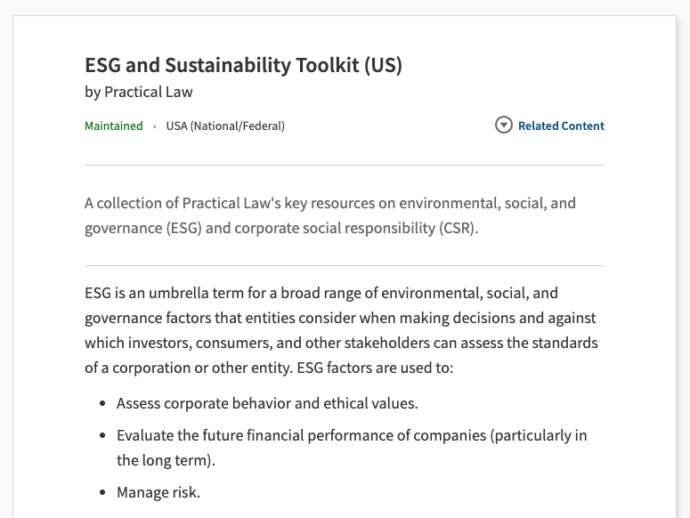Part 1
There is a lot of pressure on in-house lawyers to help the company properly respond to environmental, social, and governance (“ESG”) demands. Some of it comes from regulation, some is driven internally (e.g., the board, employees), and a lot come from external sources (i.e., customers, activists, investors, media, etc.). For in-house lawyers, understanding ESG principles is crucial given the legal, ethical, and strategic dimensions they encompass.
In late 2022, I wrote about the questions in-house counsel should be asking when it comes to ESG. Now I will take the analysis further.
Welcome to a three-part series on ESG for in-house counsel. Each part will focus on one pillar of the ESG pantheon. Today we discuss the “Environmental” aspect (i.e., the “E” in ESG) which, in terms of legal and strategic focus, demands particular attention due to its direct impact on regulatory compliance and corporate reputation, among other things.
Highlights:
|
Jump to ↓
| Why does ESG matter at all? |
| The critical role of the “E” in ESG |
| The other side of ESG |
| Navigating the different sides of ESG |
 |
Why does ESG matter at all?
In-house lawyers play a pivotal role in ensuring that their organizations navigate the complex landscape of ESG effectively. Governments globally are enacting stringent regulations around environmental protection, social justice, and corporate governance. In-house lawyers have a huge role to play in helping ensure their companies comply with these laws to avoid penalties, litigation, and reputational damage. Most in-house legal departments are responsible for at least one of the ESG pillars (and sometimes all three). Here are just a few reasons why ESG is so important:
- Due diligence: ESG due diligence is now table-stakes in mergers and acquisitions.
- Risk management: Climate change, resource scarcity, and environmental disasters pose significant risks. In-house lawyers help identify and mitigate these risks.
- Social and governance risks: Labor disputes, data privacy breaches, and governance failures can have severe legal and financial repercussions. In-house counsel has a “watch dog” role to play here.
- Corporate strategy and reputation: Companies that integrate ESG into their core strategy often achieve better financial performance and resilience. Transparent ESG practices build trust with investors, customers, employees, and regulators. In-house counsel play a large role in communicating these efforts and ensuring accurate reporting.
- Litigation and liability: Proactive ESG compliance helps prevent potential litigation related to environmental damage, corporate governance, etc.
- Crisis management: In the event of an ESG-related crisis, in-house lawyers are instrumental in helping manage the response and mitigating damage.
As you can see, to the extent these ESG issues are not on your plate or the plate of the legal department, there is a tremendous opportunity to add value by becoming the “expert” and leading the way. It is also a way for you to collaborate with other high-level leaders at the company and get face time with the Board of Directors.
The critical role of the “E” in ESG
The environmental (“E”) aspect of ESG encompasses a company’s impact on the environment, including its use of resources, waste management, and contribution to climate change. For in-house lawyers, this typically means heavy involvement regarding environmental laws and regulations in force in the countries and cities where they operate. Non-compliance can lead to large fines, legal battles, and (worse) operational shutdowns. An offshoot of this high level compliance is ensuring the company obtains and maintains necessary environmental permits and licenses. Either due to laws or internal policies, companies are increasingly required to:
- Measure, report, and reduce their carbon emissions.
- Assess risks posed by climate change.
- Reduce energy consumption and transition to renewal sources.
- Build energy efficient products.
- Adhere to laws and regulations around water and air pollution, waste management and safe hazardous waste disposal.
- Recycling management.
- Train employees on ESG issues.
- Environmental impact assessments.
- Engage in environmental due diligence in M&A.
- Environmental reporting.
- Deal with ESG clauses in contracts.
- Find and manage sources of water (soon to become the “oil” of the 21st century).
In-house lawyers help guide all these processes, facilitate agreements, compliance, and investments, and deal with the inevitable litigation or regulatory enforcement issues. Likewise, the strategic in-house lawyer is looking for the opportunities inherent in these critical environmental factors, including business opportunities and competitive advantages.
 |
The other side of ESG
While a lot of people and companies advocate for the importance of ESG, there are a number of skeptics who view it as an unnecessary burden offering limited tangible benefits – especially when it comes to environmental issues. They focus on the costs associated with implementing ESG measures, including compliance, tracking, managing, reporting, and adopting sustainable practices, which are high, especially for smaller companies.
Likewise, there is debate about the economics of ESG. Skeptics argue that the financial benefits of ESG are not always clear or guaranteed, making it a risky investment. Also, a focus on long-term sustainability can conflict with the pressure to deliver short-term financial results which, especially for publicly traded companies, is a quarter-to-quarter problem.
There are also concerns (on both sides of the issue) that some companies may engage in “greenwashing,” making superficial or misleading claims about their ESG efforts without substantive actions to back them up. Lastly, in industries where ESG is not yet a priority, companies that invest heavily in it may find themselves at a competitive disadvantage against those that do not.
There is also a political angle to the opposition to ESG. Some argue – again, in particular to environmental laws – that ESG principles interfere with free market dynamics, arguing that market forces, rather than regulatory or social pressures, should dictate corporate behavior. And, as we are all aware, ESG initiatives often intersect with broader political and ideological debates, leading to vocal resistance from those who view them as politically motivated or aligned with specific agendas. This can also come in the form of attacks on companies that do not prioritize ESG initiatives. Meaning a lot of friction for companies that do or do not prioritize such goals (and a lot of work for the legal team to deal with all the different viewpoints and obligations).
Navigating the different sides of ESG
It is difficult to know where support for, or opposition to, ESG initiatives will originate. It can be internal (e.g., the board, C-Suite, employees) or external (e.g., regulators, politician, activists). Regardless, in-house lawyers must find a way to balance what the company wants to (or must do) around ESG against the skepticism (or fanaticism) and concerns from outside the company. Here are some ways in-house lawyers can help put the company on solid footing regardless of the company’s interest in (or lack of interest in) ESG goals:
- Understand the company’s goals: To start, don’t assume you know the company’s interest or lack thereof in ESG. Take the lead in engaging various departments within the company to build a unified approach to ESG. Next, if it fits into the strategy, help the company engage with external stakeholders, including investors, regulators, and community groups, to understand their perspectives and expectations regarding ESG.
- Do the math: Conduct a cost-benefit analysis of ESG initiatives to demonstrate potential financial benefits or lack thereof. If positive, emphasize the long-term financial and reputational benefits of ESG, including increased investor interest and customer loyalty. Use technology and data analytics to track and manage ESG performance. Base ESG decisions (pro or con) on accurate data and analytics.
- Be real about it: if the company is going to go down the ESG road, ensure that ESG commitments are backed by genuine actions and measurable outcomes and not “greenwashing.” Then communicate clearly and develop clear and honest communication strategies to convey ESG efforts and their impact to stakeholders, internal and external. If you are facing criticism for engaging in ESG efforts, focus on the math and why it makes economic sense for the company to comply.
- Prioritize Regulatory Compliance: no matter your viewpoint, in-house counsel must take the necessary steps to help ensure the company is complying with any applicable ESG laws or regulations. Identify and address potential ESG-related risks proactively, ensuring the company is prepared to handle crises and reduce liabilities.
Understanding and integrating ESG principles is not just about compliance but, in most cases, is also about driving strategic value for the company. The “E” in ESG is particularly important for the legal department because of its direct impact on regulatory compliance, risk management, and corporate reputation. That said, not everyone is 100% on-board with ESG initiatives and in-house counsel have a role to play in balancing those viewpoints and helping the company achieve its ESG goals, wherever they may be. If you have access to Practical Law, there are a number of resources to help you with the process.
 |









